The spider, not very pleasant but very useful !
Spiders, we all see them in our homes. Whether you are phobic or forced to see them disappear because they multiply, this file brings together a set of answers and products that will allow you to best fight against this insect.
|
I wish |
|---|
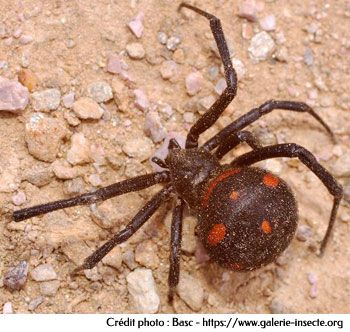
The spider : Latrodectus tredecimguttatus The spider is part of the large family of arthropods (articulated feet) like insects, and belongs to the class of Arachnids like the mite, the tick or the scorpion.
Small difference with the insect family, it has 8 legs instead of 6 and its body is made up of 2 parts, the head and the abdomen, instead of 3 for insects (the 1000 legs being of course one of the exceptions ! ).
Its name comes from Greek mythology: Arachne, a great weaver and embroiderer, angered Athena who transformed her into a spider.
Fear of spiders or Arachnophobia
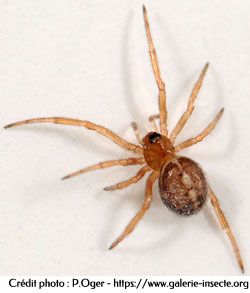
Most people have been afraid of spiders for a very long time, but few people really know why !
It is likely that this fear comes from rumors that the spider bites, that it is dangerous, that it can be deadly, attacks humans, lays eggs under the skin, ... Most of these rumors are false or taken out of their contexts.
The spider, unlike the scorpions, cannot sting but it can bite. In France, very few species are physically capable of biting a human being (the spacing of the hooks being too small). Only 12 of them can penetrate our skin.
When we talk about spider bites, it is most often a slight irritation caused by the injection of venom between the dermis and the epidermis. Apart from an allergic reaction as with wasps, bees or hornets, the "sting" is quite benign.
In most cases, when you "tickle" a spider, it either flees or folds its legs and plays dead.
The spider is not a "vampire", unlike mosquitoes, ticks or bed bugs. If she bites, it's just to defend herself and not to eat. But it is true, with a few rare exceptions, that spiders have venom glands, venom which they use to paralyze their prey.
Arachnophobia can be cured. There are several therapies that will help you lose that spider phobia.
Are spiders dangerous ?
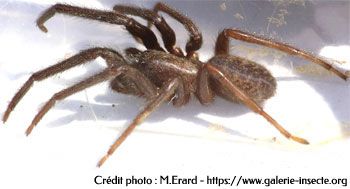
There are about 40,000 species of spiders in the world, including 1,600 species in France, but only about ten are dangerous for humans.
Most European spiders only live for one year. Depending on the species, they perform 5 to 10 moults until the adult stage where they are able to reproduce.
For most spider bites, a simple disinfectant is needed. But for some particularly venomous species, this will not be enough. Depending on the venom, there may be neurovegetative disorders, headaches, muscle spasms, paresthesias, psychic disorders, nausea, erythema and local edema,... In all these cases, you must immediately go to the doctor. 'hospital.
Throughout the American continent there is a particularly dangerous species, Latrodectus mactans (Black Widow). Its venom contains alpha-latrotoxin, a powerful neurotoxin.
The most dangerous in the world is the Latrodectus mactans mexicanus but rest assured, it is not normally found in France.
The Latrodectus tredecimguttatus (La Malmignatte), cousin of the famous Black Widow, can be found in the south of France but also along the Atlantic coast up to Morbihan. This spider appreciates the immediate vicinity of our homes. Cases of biting are more frequent.
You can also find in France :
- the Lycosa of Narbonne (Lycosa narbonensis): living far from any dwelling, it is rarely in contact with humans
- Florentine Segestria (Segestria florentina): this species, which can be found almost everywhere in France, lives in holes in walls. It is therefore often present near dwellings. This spider is not particularly aggressive "if you don't bother it, it won't bother you!"
- Steatoda nobilis: although originating from the Canary Islands, it is extremely common in southern Corsica. It is found everywhere on vegetation, tree bark, nooks, buildings.
You still have to put things into perspective. In France, only a few large species can be dangerous for humans (such as Latrodectus whose bite is particularly poisonous but which can be treated very well in hospital). Spiders are actually much more harmless than wasps and mosquitoes and so far there have been no reported fatalities from a spider bite originating in France.
To learn more about La Malmignatte see the INRA website and for the black widow spider see wikipedia.
Is the spider useful or harmful ?
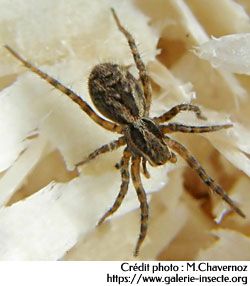
Apart from a risk of being bitten by a person who has put on a piece of clothing or a pair of shoes with the spider in it, the spider is more useful than harmful.
Apart from Bagheera kiplingi, a South American spider, which feeds mainly on acacia shoots, spiders are carnivorous and kill mainly flying or crawling insects. They catch them either using traps or lying in wait. They can also feed on small crustaceans such as woodlice or even other spiders.
We won't go so far as to say that you have to breed spiders in your house to get rid of flies and mosquitoes, but if you have a few and they don't bother you, leave them alone!
In order to respect the balance of nature, the spider also has its predators. There are of course man and his pesticides... but also birds, lizards, insects like the praying mantis, and even other spiders.
The mower spider or opiliones
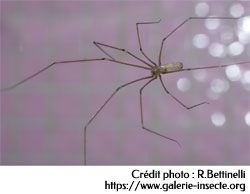
Most people who can't stand spiders tolerate the "reaper" (Pholcus phalangioides), probably because everyone knows it's perfectly harmless. And that's true ! This spider is harmless to humans. It has neither venom nor silk (no gland to weave webs).
Unlike other spiders, it will also feed on prey that is already dead. This spider, which is carnivorous, feeds on the corpses of insects or other small animals. It captures its prey with hooks located around its mouth. The legs of opiliones detach easily, so it is not uncommon to encounter individuals with fewer than eight legs.
According to some gardeners, the opilione would be a predator of the red spider mite, which is common in plants. Its predators are mainly birds, reptiles, spiders and other carnivorous insects.
Since spiders are chilly, they mainly enter homes in the fall, hoping to find a dark and warm little corner.
To scare them away, we have found various tips on the forums (we leave it to you to test them) :
- in the different rooms, place a few tomato leaves in a dish,
- chestnut wood and chestnuts: the smell is unbearable to them and drives them away. It is true that on chestnut frames, you never see a spider's web !
- put horse chestnut oil or lavender essential oil around the edges of doors and windows,
- apply to your frames a mixture of 0.5 liters of white vinegar with 40 drops of Niaouli essential oil,
- Apply a solution of potassium alum (80g of alum stone in one liter of lukewarm water) on the edges of doors and windows.
Our "Habitat Insect Repellent" repellent will also give very good results. Composed of Citriodiol, extracted from eucalyptus citriodora, this substance has a very powerful repellent power.
How to eliminate the spider ?
For people who really want to kill a spider without approaching it, the most effective products will be :
- our All Insects Aries insecticide aerosol (death is instantaneous),
- our 5% 4J insecticide spray (the spider dies in the moments that follow).
- Finally, the Fogger Habitat will act by saturating the volume of the room with insecticide. The diffusion of biocidal active ingredients of plant origin (pyrethrum + geraniol) will be deposited in the smallest corners, thus eliminating all the spiders still present.
*PAE : Ready to use
Frequently Asked Questions About Spiders
Q: Looking for insecticide for spider because millions of small black and fast spiders of 1cm on the gravel of my garden
A: Our 5% diluted 4J insecticide will work. However, be careful when using this product outdoors because the pyrethrum it contains degrades quite quickly under the effect of UV rays and heat. Consider getting a specific insecticide for outdoor use.
Q: We are invaded by small black spiders on the front of the house. What do you offer us? The bed bug product worked very well.
A: We have no solution against spiders other than treating them with our insecticide when they are on the facade.
Q: I have just discovered your site and I am very interested in your products. I live near the forest, I would like to know if your products work effectively on spiders (medium and large) ?
A: We do not have an official test on the effectiveness of our insecticide on spiders. We know that it is effective on certain species and that the dilution to use is at least 5%, and 10% for large spiders.
Q: Hello, I would like to know if your insecticide would be effective on spiders please. Thank you in advance, .
A: Our insecticide is not targeted just for spiders. It is a universal insecticide. But our tests and customer feedback show that it is very effective on the spiders in our homes.
Q: I'm looking for an organic spider repellent for my house which always contains a lot. The tomato leaves worked but no longer work! THANKS.
A: Our Habitat Insect Repellent, based on eucalyptus citriodora works well on spiders.




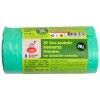


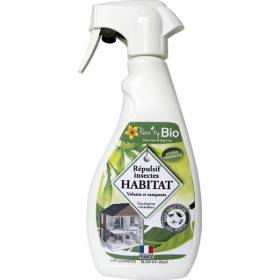
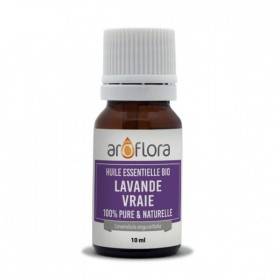
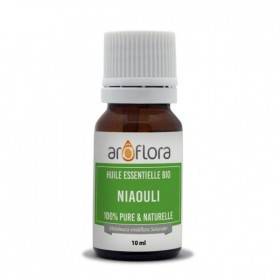

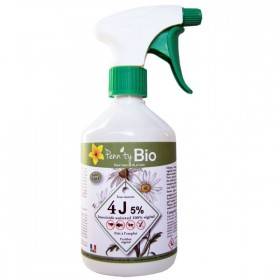

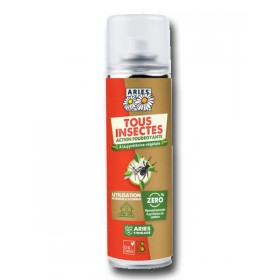
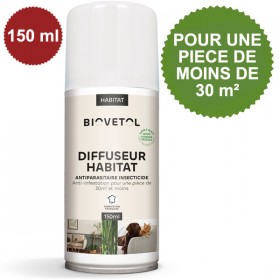
Customer reviews
Livraison express. Colis toujours aussi bien préparé (cales, flocons, adhésif sur les bouchons qui risquent de couler). Bravo pour votre professionnalisme.
Isabelle
Beaucoup de soins dans la commande reçue. Je recommande!
XX
Très bon site, très sérieux je recommande, produits de qualité et service après vente au top, de plus livraison des plus rapide et produits très bien emballés, tout est parfait
virginie
Livraison très rapide et colis emballé soigneusement.Site à recommander.
isabelle d.
comme toujours excellente réactivité, livraison très rapide et qualité produits TOP. Merci pour votre compétence.
Annick P.
MOI JE DIS INCROYABLE !!!<br /> Plus que mieux d'une rapidité de dingue ! bravo et le colis impeccable surprotégé.<br /> Que toutes les entreprises prennent exemple sur vous. merci
AURELIE A.
Vos produits sont de bonnes qualités et les produits très bien emballés
Dominique
Françoise
Merci pour votre efficacité et votre gentillesse, commande, livraison, petit mot agréable, tout était parfait !
Sylvie
Très bon site, du personnel sérieux et la livraison en temps et en heure. Merci
Marine T
Très bons produits efficaces.
XX
Excellent service après vente après un problème d acheminement de colis par la Poste. Une relation client de très grande qualité. <br /> Cordialement,<br /> <br />
PV
j'ai bien reçu la commande et je vous remercie pour votre efficacité.
Margot
Très contente des produits de qualités et une commande reçu très rapidement. Merci
PATRICIA A.
ANNE
Après 2 traitements à 3 jours d'intervalle, j'ai réussi à éradiquer toutes les punaises de mon canapé. Produit hyper efficace que je recommande vivement.
Emmanuelle
Bonjour, colis bien emballé arrivé sans encombre, démarche écolo bien ancrée et petit mot perso. Merci à l'équipe de Penn'Ty Bio.
Sofi
Première commande chez Penn'Ty Bio : <br /> - navigation sur le site = 5/5<br /> - préparation du colis = 5/5<br /> - Prix compétitifs = 4/5<br /> - Qualité des produits sélectionnés = 5/5<br /> <br /> Vendeur à recommander.
Gaëlle
Boutique très sérieuse avec un envoie rapide et des produits super efficaces.
XX
Super, livraison rapide, suivi très rigoureux, site de confiance, très sérieux à recommander... Merci pour tout.
Bernard
Parfait !
Mireille
anne-marie B.
Maryse
Je vous remercie beaucoup de m’avoir fait profiter d’un acheminement par Colissimo alors que rien ne vous y obligeait, sauf votre conscience professionnelle, chose rare de nos jours et qu’il ne faut jamais manquer de souligner.
Cécile
Merci beaucoup le colis est arrivé à la poste hier et je te retire aujourd'hui Merci pour votre efficacité et votre rapidité
Ingrid
Un grand merci pour cette commande envoyée très rapidement. Je recommanderais votre site
Elise
Site clair, envoi rapide, marchandises bien emballées, et un petit mot charmant!
SM
Je viens de recevoir la pastille noire aujourd'hui et je vous remercie de votre envoi gratuit (ce qui est rare de nos jours).
Laurence
Comme toujours service "au top" réactivité, qualité produits... BRAVO et merci pour la qualité de votre travail
Annick
Emballage au top. Livraison rapide et sans dégâts.
xxx
Je voulais vous remercier +++ pour votre gentillesse et surtout... votre compétence. C'est vraiment de l'excellent travail... j'ai été bluffée :-)<br /> Renseignement téléphonique 10/5 - produit 10/5... encore merci
Maryse
Pas encore essayé le produit, mais le site est très sérieux. Livraison dans un temps éclair, même si je suis en Belgique. Emballage soigné. On peut faire confiance.
Roberta
trés satisfaite de ma commande,( produit, et livraison,rapide ) MERCI
Danièle M.
J'ai enfin reçu le petit colis, hier. Il a mis un mois pour me parvenir, mais vous n'y êtes absolument pour rien, comme je le pensais, il a été mis de côté lors de la grève nationale. Je vous remercie d'avoir fait faire des recherches, j'ai reçu un mot de la poste.
Hervé
Bon produit, efficace et laisse une odeur plutôt agréable. Expédition rapide, emballé avec soins. Je recommande
Mary
Claudine
Je vous remercie pour vos services. C'est très agréable d'être informé de la sorte.
Anthony
Service rapide et efficace. Bons produits
XX
Je voulais juste vous remercier. J ai reçu mon répulsif " lézards" aujourd'hui, un petit mot super gentil joint à ma commande ça fait plaisir. J espère que ça va fonctionner. Bonne journée à vous et merci.
Cynthia
Bon produit. Merci Penn'Ty Bio. Un seul passage dilué à 5% et les puces ont disparus. Il en restait deux ou trois qui ont dû se perchés pendant le traitement mais sinon c'est performant.
Axel
Produits utilisés depuis très longtemps, toujours la même qualité ! Je recommande, les délais de livraison sont très courts, produits très efficaces.
Laurence
Super produits, envoi rapide et soigné, conseils et échanges courtois ! Une jolie boutique en ligne pour acheter en toute confiance ! <br />
Patricia
Produits facile à utiliser, efficaces et finalement pas plus onéreux, à l'usage que des produits issus de la pétrochimie. Service livraison impeccable. Je recommande +++<br />
XX
clair net précis. merci
jannick
Juste un petit mot pour vous remercier du message accompagnant mon colis ! Je croise les doigts pour que les produits marches mais entre-temps, je voulais vous remercier et en profiter pour vous souhaiter à mon tout un joli printemps.
Rose B.G
Livraison rapide et soignée. J'utilise les produits bio qui sont de très bonnes qualités. Un savon m'a été envoyée par erreur à la place de celui commandé et il m'a été remplacé très rapidement. Bravo pour leur réactivité. Je recommande fortement ce site.
Liliane
Merci beaucoup pour la rapidité avec laquelle vous m'avez fait parvenir le diffuseur.
Bichette
Pour ma part j'ai été satisfaite de la réalisation de ma commande et du délai de livraison. Je recommande votre société.
Nelly
Merci pour votre envoi : rapidité, ponctualité, information de suivi du colis etc. Vraiment du bon boulot.
E.G
fidèle cliente de Penn'Ty Bio, je ne me fournis que chez eux.
XX
Un grand merci pour votre offre et votre professionnalisme. Pour un service en ligne, vous savez vous rendre proche de nous. Bravo et "suerte" !
Pierre M.
Très bon produit facile en entretenir, pas cher.
XX
Site internet complet, beau et facile d'utilisation<br /> Commande complète et correcte.<br /> Commande emballée a la perfection avec du matériel recyclable, compostable<br /> Délai d'envoi respecté même a l'étranger (Pays-Bas)<br /> Mention spécial pour le petit mot personnalisé ++<br /> On sait pourquoi on commande chez Penntybio depuis 10ans :)<br /> Bonne continuation
Jennifer A.
Commande facile, livraison impeccable et produits fiables. Merci.
Isabelle
Bons produits. Fonctionnent très bien.
xx
Toujours parfait, livraison, emballage, délai et gentil petit mot personnel pour me remercier de ma fidélité.
XX
Grande gentillesse et efficacité : que demander de plus ? Merci !
Chantal M.
2 commandes à mon actif et jamais déçue. Vous avez gagné une cliente régulière :) Merci pour votre sérieux et le contenu bien rempli de votre site ! c'est super d'avoir une description hyper détaillée de chaque produit.
clara
Rien à redire, de la commande à la livraison.
XX
Colis bien arrivé. Emballage remarquable. Diffuseur très joli, très efficace et peu bruyant avec de la couleur qui change. Très satisfaite de la commande.
Sabrina
Envoi rapide et soigné, produits efficaces et réponse rapide à mes questions. Je recommande.
xx
j'ai reçu mon colis aujourd'hui, merci c'est très rapide et sérieux.
Clara
Très bien , bon produits, La prochaine commande avec plaisir, livraison très rapide.<br />
Rainer
J'ai bien reçu le colis sans aucun problème. Merci pour la rapidité et le sens du service.
Nicolas
Ravie de découvrir un site qui présente des produits de qualité avec une vraie démarche éco responsable à des tarifs intéressants.
XX
J'ai été très déçue de ne plus trouver mon déboucheur dans mon biocoop habituel, et perplexe en apprenant qu'il était remplacé par un produit à base de soude...c'est comme ça que je vous ai trouvé sur internet.<br /> Alors merci pour le dépannage, pour le mot gentil qui accompagnait mon colis , et bravo pour le calage en amidon de maïs compostable!<br /> Bravo pour votre démarche et à très bientôt.
Cécile D.
Site pratique, compétent, prix corrects. Un envoi très rapide, et je dirai "parfait".
Greg
Produits d'excellente qualité, arrivés rapidement, et conformes à leurs descriptions.
Michelle G.
Très rapide pour la livraison en Belgique et sérieux. Merci<br />
Corinne
accueil téléphonique personnalisé réactif compétent et bienveillant, livraison rapide et conforme. BRAVO merci pour la qualité de votre travail
Annick
excellent.
XX
Envoi très rapide et bravo pour votre site de reconnaissance des insectes nuisibles.
Brice
Site sérieux, proposant de bons produits, efficaces en particulier sur les punaises de lit, fléau actuel. Merci car entre les produits et les housses de matelas nous avons réussi à les éradiquer dans deux maisons à deux ans d intervalle. <br /> Bravo aussi pour la livraison la plus écologique possible.
L.C
super contente, j'y trouve facilement les produits dont j'ai besoin et le service est impeccable et gentil !
Hélène S.
Sav rapide et disponible. Au top
Severine
Livraison en temps record à l'adresse indiquée en France puis départ dans l'océan indien. Reception des produits en quinze jours à l'autre bout du monde : ravie. Je vous laisserai les avis produits une fois utilisés. Le site est très bien fait et très agréable à utiliser. Le petit mot à la main dans le colis humanise la transaction, je l'ai apprécié. Je pense que vos produits sont très utiles et je vous souhaite une belle réussite et sur la durée.
Sylvie D.
Explication, commentaire et livraison en un temps record, tout était parfait, même le petit mot de remerciement écrit à la main ! Merci beaucoup
Monique S.
Dimanche soir, invasion de vrillettes du pain. Lundi matin, commande en urgence des produits verts adéquats. Mardi, livraison, traitement et fin de l'invasion.
Jean-Pierre
Bonjour Monsieur,<br /> Nous nous étions parlés au téléphone il y a quelques années. Bravo pour l'évolution de votre site et vos dossiers instructifs. Vos produits aussi sont très bons. Bonne continuation, bien cordialement.
Marina
sérieux
XX
Bien, la majeure partie des produits sont efficaces. Je connais cette boutique depuis plusieurs années, je recommande ce site.
XX
Je suis cliente depuis de nombreuses années. Toujours satisfaite du site, des produits et de la livraison.
martine O.
Je voulais non pas faire une réclamation; mais vous féliciter pour vos produits que j' ai bien reçue, et également pour la rapidité de votre envoi ce qui est plutôt rare dans d'autre site.
Jérôme
SATISFAITE
ANNE
Livraison rapide. Produits bien emballés.
Bruno
livraison rapide, produits bien enveloppés avec juste un petit bémol : pour l'imperméabilisant dont le couvercle n'était pas bien fermé.
Alain
Je tenais à vous remercier pour la commande que je viens de recevoir ce matin. Merci beaucoup et je n'hésiterai pas à recommander sur votre site.
Sandrine
Livraison rapide , le tout correspond à mes attentes.
Julie
Totalement satisfait. Les produits sont super efficaces et tout est très bien suivis. Je recommande vivement ce site.
Stéphane N.
merci de votre disponibilité et amabilité!
Eric
Toujours très bien et parfaitement emballé ! Merci<br />
Valérie
Parfait. Rien à redire. Extrêmement efficace.
Quentin
Envoi rapide et soigné. Emballage ecoresponsable. Je suis ravi d’avoir trouvé des pièces de rechange pour les diffuseurs à huiles essentielles!
Ina L.
J'ai bien reçu mes articles et je vous remercie pour la livraison rapide et impeccable !
Françoise
Vos explications par email ont été très claires et votre diligence dans le traitement de ma commande et de mes demandes est très appréciée.
Henri
Bon rapport qualité-prix. Envoi rapide et sécurisé !
Chrile
Livraison rapide et produit conforme à la description. J'approuve à 100% le principe du recyclage des éléments d'expédition. Un produit fabriqué une fois soit avoir plusieurs vie. Bravo pour cette initiative.
Christophe
Produits de bonne qualité, naturels et efficaces, expédition rapide et bien emballée, sav très rapide suite à une erreur de ma part,
XX
Bravo ! je vous félicite pour votre efficacité et ne manquerai pas de vous conseiller.
Nicolas
Merci beaucoup pour l'info, c'est rapide chez vous, très appréciable!
Denis
Très réactifs entre la commande et la livraison. Je suis toujours satisfaite de mes commandes soigneusement emballées !
France L B
Après essais de divers produits, votre insecticide 4J est le seul à être venu à bout des puces ramenées par le chat de la maison. Livraison rapide par chronopost
JEAN MARIE
C’est la première fois que je commande sur ce site et pas déçue livraison rapide de ce produit que l’on ne trouve pas partout. Je recommande
Patrick
Très satisfaite, merci.
Christine
Commande bien reçue . Je suis très satisfaite Merci pour votre sérieux
LILIANE
Une boutique en ligne, sympa et très réactive. On apprécie surtout la livraison express. Pas besoin d'être américain pour livrer dans des délais de champion !<br /> <br />
Daniel de Paris
Livraison rapide et fiable, dès que le chèque a été reçu. Produits de bonne qualité.
Chantal H.
rien a redire, sauf, le montant des frais de livraison, un peu élevé.
XX
Très bien...merci.
Olivier
Merci pour votre geste que j’apprécie.<br /> Cela fait plaisir de retrouver l’esprit commerçant de proximité chez un vendeur en ligne. Je surveillerai attentivement cette nouvelle livraison.
Philippe
C'est ma première commande chez Penn'Ty Bio, et ce ne sera pas la dernière.<br /> J'étais à la recherche d'un nouveau diffuseur d'HE et, après discussion avec Quentin, mon choix s'est arrêté sur l'Elixia (Direct Nature) qui est d'une efficacité redoutable et d'un silence absolument surprenant.<br /> La livraison s'est faite en 72h en point retrait avec un conditionnement hyper sécurisé.<br /> Lors du déballage, j'ai constaté un léger défaut de finition sur la verrerie.<br /> J'en ai fait part à Quentin par texto avec photos à l'appui.<br /> Il m'a aussitôt recontacté pour me proposer un envoi d'une nouvelle verrerie dès que disponible.<br /> Un professionnalisme et un sens du service exemplaires qui font de cette enseigne une valeur sûre.<br /> Penn'Ty Bio est vraiment la boutique en ligne qu'il vous faut connaître.<br /> Je vous la recommande vivement.
Jean-Yves S.
Livraison rapide, emballage plus que parfait, le diffuseur NEOLIA est merveilleux pas bruyant, fonctionnement idéal. Merci PENNTYBIO pour votre sérieux, site web à recommander.
CLAUDE
Livré hyper vite. Bravo !
Mick
Excellent site rapide et efficace. Descriptif intéressant.
XX
Parfait ! Envoi rapide et produits de qualité. Merci pour le petit mot. Je suis très satisfaite !<br />
Julieanaïs
Correspond à mes attentes
Henry
Bonjour. Je souhaite vous remercier pour votre rapidité. Le colis est arrivé en bon état . Les huiles que nous avons commandées embaument la maison. Ce diffuseur est génial.
Christian
Hélène
Livraison rapide et très bien emballé et protégé. Très bonne efficacité. <br /> <br />
XX
Toujours impeccable, les produits, les services. Depuis que j'ai changé de facteur, plus de soucis. (Ça n'est arrivé qu'une fois!!!)
XX
Service de qualité, suivi rigoureux, et rapidité au rendez-vous. Les produits sont très fidèles à leur description et pour un coût serré. A recommander fortement.
JACKY
Super !
Yann
Je suis très satisfaite de mon échange avec le service client (personne à l'écoute, de bon conseil). Envoi rapide et soigné, avec un petit mot sympathique de l'équipe, le top!
XX
merci pour votre professionnalisme. Merci pour les produits envoyés dans de bons délais. Merci pour la qualité de vos produits
Marcelle
Merci. Je tenais à vous faire part de ma grande satisfaction. Je suis enchantée par les produits et par le service. Salutations et bonne continuation,
Odile
j'ai reçu mon colis aujourd'hui, merci c'est très rapide et sérieux.
Nathalie
Commande reçue rapidement, frais de port raisonnables pour expédition à l'étranger et les produits sélectionnés au top! Merci!
Cédric Adolphe B.
Excellent!! Commande passée le lundi, reçue le mercredi!!! Les produits sont en plus de super qualité !
MADELINE
yvette
Livraison rapide et avec colis préparé avec soin :)
Florian
Nous sommes très satisfaits du service client : mot personnalisé dans le colis, disponibilité du service après-vente... Nous souhaitons à votre société un succès croissant.
Sara
Très bien ! envoi rapide et conforme à ce qui est annoncé.
Jacqueline S.
Les produits achetés sont excellents. Ils répondent parfaitement à ce que je cherchais. Bravo pour votre site
Michel
super emballage écolo...bravo !
Isa
Bonjour Sophie et Quentin,<br /> Je viens de recevoir ma commande et je tenais à vous remercier pour la rapidité de l'envoi, votre gentil petit mot et le petit présent qui sent bon et donne envie. Bel été à vous deux également
Geneviève
Site très pratique. Commande aisée. Suivi régulier. Délai de livraison respecté. Colis très soigné. Tout est parfait.
Nicole
Très contente de vos produits.
nathalie G.
Un grand merci pour la qualité et la rapidité de votre réponse.
Simon
J'adore ce site qui fait un vrai travail de sélection de produits que je ne trouve pas ailleurs et sur une large gamme. Je recommande.
Veronique G.
Suite à un précédent message notifiant une erreur de produit à la livraison, Penn'Ty bio m'a fait parvenir à titre gracieux le bon produit. Merci
Martine
Merci pour vos conseils avisés. Et merci pour vos produits de qualité.
Loïc
Prix intéressants. Expédition super rapide à bon prix. Et tout ça de façon agréable !
Alexis M.
Livraison rapide et bien emballé. Petit message manuscrit qui fait plaisir :)
xx
Une grande compétence, Monsieur Dufil est très professionnel et sait soigner ses clients. Quand à la gamme de produits proposés, elle est parfaite et complète.
Alain A.
livraison rapide ,prix raisonnable , produits super efficace j'ai vite calmé mes douleurs lombaires ...enfin soulagée . Merci pennty bio
JEANNINE
Modèle conforme bien emballé délai respecter continuer comme ça parfait.
Carlos
Livraison très rapide et produits intacts à l'arrivée grâce à un emballage impeccable.
Etta
Site très sérieux, de très bons produits et la livraison est rapide.<br />
Isabelle
Comme d'habitude, envoi soigné, produits performants, Merci.
XX
Commande reçue assez rapidement. Merci pour votre sérieux.
Émilie
Je me permets de vous écrire un petit mot afin de vous dire que votre site est très bien fait.
Tom
Impeccable.
Christine
Très satisfaite. Merci.
CM
Jean Claude
Site sérieux. Bons produits.
Magali
Diffuseurs qui sortent vraiment de l'ordinaire, un envoi parfait - merci BCP
Anthony
Très satisfait du site livraison rapide.<br />
Michel
Bonjour, j’apprécie depuis longtemps votre travail : la qualité de vos informations et des produits que vous vendez.
Frederic
Cliente fidèle depuis plusieurs années, je ne peut que recommander ce site. Tout est parfait. Tous les produits au top, rapidité d’envoi, gentillesse, allez y les yeux fermés vous ne serez jamais déçus.
Marité 06
Excellent service et livraison rapide. A conseiller pour la santé des animaux (chiens et chats)
MICHEL
Livraison rapide et petit mot manuscrit joint au colis, vraiment très sympa! Merci et continuez, vous le méritez.
Jean-Pierre
Super produits accueil plus que parfait gentillesse. Livraison au top merci beaucoup
Christiane
Produits livrés rapidement dans un colis non surdimensionné, les produits sont conformes à la description. Je recommande vivement ce site très bien fait !
Hervé
Pennty bio prends le temps de renseigner et donne de très bons conseils.<br /> Les produits sont emballés soigneusement et la préparation des commandes hyper réactive. Je recommande les yeux fermés !
Mattloumag
Livraison efficace et bon contact oral avec mon interlocutrice.
Maussane
L’esprit commerçant de proximité chez un vendeur en ligne !
Philippe
livraison rapide, produit conforme.Prix séduisant.
XX
Parfait! Préparation et expédition de la commande hyper rapides. Emballage très soigné (j'ai acheté un produit fragile). <br /> Je suis très satisfaite!
Elise M.
Commande reçue rapidement, très bien
XX
Client depuis plus de 10ans. Toujours satisfait du matériel propose. Boutique sérieuse prix compétitifs livraisons et suivis rapide.
XX
Commande passée le jeudi soir, colis livré chez mon "commerçant-relais" le samedi matin. Quelle rapidité ! Du vrai professionnalisme !
Emeline
2 commandes à mon actif et jamais déçue. Vous avez gagné une cliente régulière :) Merci pour votre sérieux et le contenu bien rempli de votre site ! c'est super d'avoir une description hyper détaillée de chaque produit.
Magali
Commande bien reçue. Je suis tout à fait satisfaite. A bientôt.
Tania
Merci pour le geste commercial, et aussi pour les nombreux conseils et l'excellent service client.
Tristan L
Je suis arrivée sur votre site en cherchant un diffuseur que je viens de commander, mais je voudrais vous dire que votre site est très intéressant, bien fait. Vos dossiers sont enrichissants merci
Joelle
Jamais déçue : les produits correspondent à la description et sont livrés rapidement.
Mireille
De très bons conseils, une livraison rapide et des produits de qualité !
Fabienne P.
Tout à fait satisfait de la qualité de la livraison ainsi que du produit commandé.
Régis
1ère commande. Très satisfaite : Colis expédié très rapidement et bien emballé. Merci pour votre sérieux.
Ghyslaine
J'ai découvert ce site en cherchant de la terre de Diatomée. Livraison rapide. Très sérieux. J'ai mis la page dans mes favoris car j'ai repéré d'autres produits.
Isa
Sophie. A
Produit anti puce extrêmement efficace !<br /> Le vendeur a pris une demi-heure de son temps pour m'expliquer absolument tout ce qu'il y avait à savoir sur le produit, de la composition a la mise en œuvre.. Bref au top ! Je recommande donc vivement Penn'ty !
Louis
J'apprécie les services de Penn'ty bio. Un maximum d'étoiles pour eux.
Ch. D.
Site très réactif livraison rapide le produit Stop tique et puce est parfait sauf le pulvérisateur.
Danielle B.
Un accueil téléphonique très agréable et de très bons conseils. <br /> Merci à vous.
XX
Merci pour cette première commande, envoyée très rapidement, et dans un petit colis, avec frais de port très raisonnables.
Valérie O.
Très satisfaite. Je recommande cette société sérieuse. bon suivi de la commande.
Sandrine
Colis parfaitement emballé et produits conformes. 1 des produits était très fragile et est arrivé en excellent état, merci :o) Pourquoi achetez à l'étranger alors qu'on a de si belle s entreprises en France? Tarifs identiques ou moins chers que chez Amazon ;o)
Stéphane C.
J'adore. Très grande diversité de produits, les explications sont simples et complètes.Quand aux colis, ils sont extrèmement bien protéger. Un grand merci.
Nadine
Contente de voir que d’autres alternatives naturelles aux produits plus nocifs soient proposés. Entreprise sérieuse dont commandes sont très bien honorées. Merci.
Capzoe
Fidèle à votre marque, je tenais par ce mail à vous féliciter vous et votre équipe pour votre longévité. Votre marque est toujours gage de qualité et sérieux.
Céline
Bon choix, bons conseils et service livraison très rapide. J'aime faire mes courses sur ce site.
FDA
Très bien !
XX
très bien je recommande.
Sylvie
Produit de qualité conforme à mes attentes, envoi rapide et soigné, très bien.
Anne
Félicitations pour la qualité de votre site & la valeur de ses informations ! Continuez ainsi ! On a besoin de vous !
Ronald
Client depuis des années Produits de qualités et surtout qualité de service.
XX
En cette période d'avant Noël, je craignais que me colis arriverais en retard. 48h après mon achat, c'était dans la boîte aux lettres. Du coup, je suis large pour mettre mon achat sous le sapin. Merci à vous
Art4
Avec les trois lettres BIO dans votre nom, je ne m'attendais pas à découvrir des billes de polystyrène comme matériaux de rembourrage. Il y a certainement plus écolo !
Michel D.
Tout est parfait : la qualité des produits, la rapidité d'expédition, la qualité du colis. Je suis enchantée et resterai fidèle à ce site.
Dominique
Merci pour l'expédition de la pièce de verrerie qui a été recu cette fois sans casse. Meilleures salutations et à très bientôt sur votre site pour un prochain achat .
Louane
Marie Aline Roux
C'est vraiment magnifique et ce cadeau a plu, je commanderais pour Noël.
Martine
On ne peut pas toujours faire confiance à des sites de ventes sur le web, mais sur Penn'Tio, j' y viens les yeux fermés. Excellente communication avec le service clientèle, un suivi sérieux. Je remercie chaleureusement toute l' équipe.
Sergine T.
Très bon site avec de très bons produits et un soin particulier apporté à la préparation de chaque commande... De plus, Sophie et Quentin prennent la peine d'écrire un petit mot de remerciement avec la commande envoyée....c'est peu commun mais très sympa....:-)
STEPHANE P.
Envoi très rapide, personnalisé et soigné. Merci
XX
Commande bien reçue;je suis tout à fait satisfaite;à bientôt
Sonia
Une utilisation de vos produits a suffit pour nous débarrasser des poissons d'argent. Merci.
Matthieu
Juste un petit mot pour vous remercier de votre disponibilité et pour vous dire également que je suis très satisfaite des produits que j'ai acheté, ils sont vraiment efficaces.
Barb.
J'apprécie depuis de nombreuses années la qualité de vos produits et le sérieux de votre site. Une petite mésaventure avec un diffuseur me permet de vous féliciter pour la réactivité de votre SAV. Bravo !
Thierry G.
Une entreprise fiable, efficace, de confiance, chez qui je recommande de faire ses achats.
S.
Client depuis de nombreuses années, je suis satisfait à la fois de la boutique et de pratiquement tous les produits achetés.
Jean-Claude
Louise
Livraison très rapide et produits bien emballés.
Catherine
Excellents services, très serviable
XX
Quel dommage pour le produit manquant, je vous remercie pour le remboursement.
Didier
je viens de réceptionner ma commande. Tout est ok. Merci pour ces produits respectant l'environnement et l'être vivant.
Anatole
Très satisfaite par Penn ty bio. En effet, suite à un produit défectueux ( housse matelas) , j'ai aussitôt reçu un bon de retour pour renvoi gratuit en colissimo et ai reçu la nouvelle housse dans les 48 h, avant même le renvoi de la première housse. Merci pour la réactivité et la confiance de cette entreprise.
dominique B.
Produit performant et raisonnable au niveau prix. Je recommande
XX
Les produits achetés sur le site sont de très bonnes qualités, et j'ai été très bien conseillée. Je recommande !
Aurore
Tout est parfait à chaque fois. L'attention portée va même jusqu'au petit message, c'est agréable. Fidèle aux produits et au site plus que jamais.
xx
La livraison est rapide, je n'ai jamais était déçue de ce site, et les produits sont pas chers et de très bonne qualité!
Patricia
Je trouve l'essentiel sur le site à des prix défiants toute concurrence. Continuez comme cela.
XX
Merci pour tout le soin que vous mettez pour une livraison individualisée, chaleureuse et aussi peu impactante que possible sur l'environnement !
Sandra
Boutique sérieuse. Commande arrivée très rapidement. Merci pour votre gentil mot avec la facture.<br /> <br /> <br />
I Defoy
Noëlle G.
Merci et surtout, continuez, c'est rare de trouver sur internet une relation aussi personnalisée sur un mode aussi agréable.
Sabine
Envoie soigné et rapide.<br /> Merci pour le petit mot à la main.<br /> Très appréciable.
XX
Personne disponible, de très bon conseil suite à des punaises de lits dans mon habitation, les produits sont efficaces car depuis aucune punaises et la vie à repris son cours ... merci pour tout
Nathalie
Très bon site. Envoi rapide. Prix moins cher que sur d autres sites. Bravo et bonne continuation.
Camille
Bravo ! je vous félicite pour votre efficacité ne manquerai pas de vous conseiller. Merci à la prochaine commande
Anthony
Très bonne adresse où l'on trouve des alternative aux produits chimiques notamment contre les insectes. Le service client est également de très bons conseils.
ck
Je suis vraiment très satisfaite de la prestation de ce fournisseur : délai de livraison très rapide et emballage des produits réalisé avec un maximum de soin. Bravo !!
Eliane
Bonjour, je voulais vous féliciter pour la clarté de votre site, la rapidité de la livraison et la qualité de l'emballage.
catherine R.
Produit conforme aux attentes.<br /> <br /> <br /> <br />
Alain
Très bien, je recommande cette boutique
Salomé
Les produits commandés sont conformes à mes attentes. Quant à l'accueil au téléphone, il est parfait et nous avons toujours trouvé un terrain d'entente. Je fais confiance à Penntybio.<br /> Merci.
XX
Très bon produit, conforme à la description.
MICHELE P.
Très contente d'avoir découvert ce site internet ! Du conseil jusqu'à l'achat c'est super. J'étais très embêtée après l'apparition de petit insecte chez nous (des anthrenes) et c'est le seule site internet e-boutique qui a pu nous renseigner dessus et enfin indiquer les produits pour les éradiquer sans pour autant nuire à notre santé (mais en respectant les conseils d'utilisation bien sûr). J'ai reçu ma commande rapidement, et avec surprise un petit mot de remerciement personnalisé avec mon nom dessus. Des détails qui au finale font la différence. Un service de qualité rien à dire. Merci !
XX
Des produits très efficaces quand on suis dans l'ordre le traitement. Un léger petit bémol sur le spray insecticide, si possible essayer de trouver un spray plus puissant et plus large pour une diffusion optimale dans les coin et recoin inaccessible. Sinon tout est nickel est une excellente qualité de résultat.<br /> PS: Il faut prendre tout les produit pour un traitement efficace en foyer privé (maison).
Florian G.
Un super magasin en ligne, avec plein de produits disponibles.<br /> L'envoi a été très rapide et soigné, avec une très bonne communication à chaque étape. Bref, une adresse à connaitre et à garder ! Merci !
Pab57
Merci à Penn'ty bio d'avoir garder beaucoup de produits de la marque Lerutan et pour le sérieux dans la préparation et l'expédition des colis. Je recommande.
SR
Très bon site. Navigation facile. Les commandes sont expédiées rapidement comme annoncé. Aucun problème depuis que je suis cliente. Je recommande Penn'ty bio.<br />
Elvyne
Livraison conforme et rapide. Les produits sont emballés dans des emballages recyclables, voire compostables : j'ai beaucoup apprécié. Je recommande ce site.
Patrick
THIERRY
Colis très bien protégé service rapide. Merci. Site très sérieux .
Elios R.
Efficacité de la livraison , très rapide . Produits livres en parfait état . Très bien emballés . Merci.
Geneviève
Livraison rapide , produits de qualité, je recommande Penn'Ty Bio.
XX
Bon produit mais frais de port un peu cher.
Marie Paule
Parfait comme d'habitude
Sylvain
Super efficace !!!
xx
livraison tip top tant en temps et en qualité.
XX
Bons produits conformes à mes attentes et livraison au top. Je recommande vivement.
Chantal P.
fiable et de bonne qualité pour les services et les produits :)
XX
Merci beaucoup pour votre rapidité et votre professionnalisme.
Julie
Hyper cher :: très déçue du prix par rapport à la quantité de produit acheté. Sur le site internet, les flacons semblent grands, or pour 80 euros je me retrouve avec 4 flacons de petits produits insecticides... trop cher
xxx
J’ai bien reçu le nouveau diffuseur fonctionnel après essai et je vous remercie pour votre confiance et votre rapidité sur le traitement de mon problème. Ce n’est pas tous les jours que l’on voit un SAV aussi efficace !
Florent
colis reçu ce jour, merci pour le flacon offert
Andrée
Bravo pour votre sérieux. Colis reçu très vite et produits impeccables. Belles fêtes de fin d'année
Mat
Bonjour Sophie & QUENTIN, Merci pour votre petit mot. . . . Ça fait chaud au Cœur de voir qu'il y a encore des Gens Comme VOUS sur cette planète ! Le monde devient de plus en FOU ! ! ! Cordialement.
Dominique T.
Site de grande qualité !
Rose Anne Marie
Très bon produit juste ce qu'il faut à prix attractifs Envoi rapide.
xx
je vous remercie pour vos services, c'est très agréable d'être informé de la sorte. colis bien reçu Merci pour la rapidité de la livraison
Bernard
Merci d'être à l'écoute pour notre terre et vos clients. Encore une fois je suis très satisfaite de ma commande. Et mes compagnons à 4 pattes sont ravis de se protéger en bio. Merci pour votre attention manuscrite en fin du bon de commande..
Raymonde julie L.
Efficace rapide et à l'écoute. Diversité des produits. Efficacité des produits. Respect des délais de livraison et prise en compte des spécificités client PMR ( ce n'est pas toujours le cas). Site bien fait pour navigation et produits bien mis en valeur. Des promos et des bons de réduction cumulés en fonction des achats. Merci pour votre efficacité rapidité et professionnalisme.
xxx
Parfaitement parfait, je ne me fournis que chez Penn'ty bio depuis qu'ils m'ont débarrassée de punaises de lit.<br />
MARIE CLAUDE G.
Everything was very nice ! Keep handling your customers likes this!
xxx
Je vous remercie de votre professionnalisme et de votre réactivité.C'est loin d'être toujours le cas lorsque l'on commande sur internet.
Gaëlle
livraison impeccable, produit bien emballé et correspondant au descriptif, excepté pour la surface de diffusion, ma salle principale doit faire 25m2 maximum et ça ne se diffuse pas au-delà.
Pascale
Je suis ravi de trouver les produits de qualité et d ‘efficacité incomparable.
Denitza K.
Service très professionnel et très rapide. A conseiller fortement.
Didier M.
Toujours aussi "réactif" et efficace<br /> Bravo et merci pour votre professionnalisme.
Annick P.
Infestés de puces de parquet, le produit a agi en moins de 24 heures. Livrés en tout autant de temps. Le seul produit qui ait fonctionné et en plus archi cool pour la nature.
Nicolas
Super, envoi rapide,bien protégé et petit cadeau !
xx
Excellente réactivité !!! Produit en stock, commandé le 23 dec à 8h30, recu le 24 dec à 9h30. On peut guère mieux faire ! Super communication avec le vendeur.
Xavier
Ma commande s'est déroulée sans aucun problème avec une livraison rapide et soignée. La satisfaction est au rendez-vs ! Continuez ainsi ! Merci et cordialement !
Etoile 07
Très satisfaite de ma commande chez Penn'ty bio. Site très détaillé, produit reçu rapidement, message manuscrit très sympathique. Je recommande !
XM
J'ai toujours été satisfaite de mes commandes chez Penn'ty bio. Rapide efficace. Surtout les caractéristiques des produits est claire et complète. et le site contient beaucoup d'informations sur les différentes gammes. Merci pour votre travail et votre activité.
XX
JM
Merci et bravo pour la qualité des produits et du service toujours aussi efficace et performant.
Annick P.
Envoi rapide. Rien a redire.
Marie France
Rapidité de traitement et petit mot avec le colis très appréciable.
XX
produit parfait.
René
Content des produits achetés, reçu rapidement et bien emballé. Merci.
XX
J'ai bien reçu ma commande. Com' dab' , rapidité efficacité ...Merci
Sally
Cliente depuis plusieurs années, j'apprécie toujours ce site. Meilleures salutations.
France
Un plaisir de recevoir les colis soignés et respectueux de la planète de Penn’Ty Bio. Merci
k.
Excellents produits. Excellent service.
James T
Bonjour <br /> C'était ma première commande sur votre site et j'en suis très satisfaite <br /> Je vous remercie pour votre professionnalisme (site, prise de commande, livraison) ainsi que pour le petit mot qui rend le tout humain. Très belle journée.
CG
Tout etait parfait, produit,prix,delai<br />
Marco
Mon avis sur penntybio, très bon produit sur ce site pas une gamme monstrueuse mais que du très bon, et pareil pour les livraisons ultra rapides et le excellent sav si besoin. Je recommande vivement. Client depuis 2018 aucun soucis.<br /> <br />
thierry g.
Merci pour votre démarche si respectueux de l’humain, des animaux et de l’environnement !
A.F
Site intéressant. Je l'ai découvert, en fait. Produits ménager éco-responsable. Bon pour la maison et non agressifs. Merci.
Mydiadao
Excellent site. Très à l'écoute. Livraison rapide. Problème avec un piège à guêpes un autre m'a été livré très rapidement. Chapeau et très agréable de tomber sur des gens compétents.<br /> Encore merci.
XX
Alex
Parfait.
Philippe
Franchement, Penn'ty bio, c'est top ♥<br /> Quentin est super réactif, de très bons conseils. Encore merci de votre efficacité.
Hélios ☼♥
Efficacité redoutable. enchanté.
Robert
colis dans les temps,emballage parfait,super accueil téléphonique pour renseignement, je recommande ce site.
ROSCO
Très satisfaite de ma commande. Emballage soigné et envoi rapide. Merci beaucoup pour votre professionnalisme !
Sophie
Bien reçu. Bravo pour votre extrême rapidité. Merci
Magali
J'ai reçu mon colis hier. Merci de vos démarches,
Sam
Sav très réactif et efficace suite à avarie durant transport. La livraison du produit en remplacement du colis défectueux à été particulièrement rapide. Merci.
Valérie
Site de produits naturels et bio très bien fait, agréable et fiable. beaucoup de produits de qualité.
Anne Marie R.
Bravo et merci : produits de qualité et service TOP... continuez !...
XX
Bon service et bon produits
Odile R
Un diffuseur plus de 80 M², avec huile essentielles eucalyptus, vraiment formidable, on respire mieux et çà sent super bon. Le matin 1 heure, et le soir 2 heures. De jolies couleur, et pour les fêtes une jolie ambiance. Bravo.
PATRICK
Site très sérieux et personnel vraiment agréable. Envoi rapide. C est parfait !
Ingrid
Après la découverte des punaises de lit dans 2 chambres de notre vieille maison, j'ai trouvé votre site. le dossier m'a été très utile et je suis très contente d'avoir trouvé des produits moins toxiques que ce que proposent les autres sites de vente.<br /> Je vous remercie d'avoir répondu à mon mail car c'est un peu l'affolement quand on découvre chez soi des punaises de lit.
Françoise S.
Excellent site d'achat. Très rapide et que de bons produits.
James
Service au top !!!<br /> Colis reçu très rapidement avec un petit mot manuscrit me remerciant de ma commande et de la confiance que je leur ai témoigné <br /> Suffisamment rare pour être signalé <br /> Je vous encourage toutes et tous à les soutenir en passant commande chez eux!!!!<br /> Longue vie à Penn’Ty Bio !!!!<br /> Ils le méritent
Pierre-Steph
Envoi rapide, emballage au top, continuez comme ça... :-)
bruno b.
Rapide, sérieux, très bien emballé, un sans faute.Merci.
L.H.
merci pour le suivi de ma commande et les mails par lesquels vous m'avez tenu informée.
Zoé
Merci pour votre sérieux et la réexpédition ultra rapide d'un achat non conforme (dont vous n'étiez pas responsable).
Marc
Service très réactif, emballage soigné , livraison rapide. <br /> Rien à redire . Continuez !!
Sophie
Très bons produits, service rapide et de qualité, rapport qualité/prix intéressant. Je recommande vivement.
Alain
interressante. Beaucoup d'articles référencés. Après pour la lutte contre les punaises de lit, je ne suis pas sure de l'efficacité de certains produits. C'est un vrai fléau ces bestioles.
Francelyne D.
Penn' Ty Bio, c'est ma référence depuis 10 ans au moins. Je ne commande mes produits de toilette et d'entretien que chez eux. Les marques et le service est irréprochable.
GAELLE
Toujours satisfait et pour les prix et pour les produits.
andré a.
Site intéressant proposant de bons produits, attractifs et respectant la nature. Le regret c'est le prix de certains articles.<br />
Catherine
Efficace, livraison rapide.<br /> <br />
H
Excellent article sur les diffuseurs d'huile essentielles ! grâce à lui j'ai pu faire mon choix basé sur une excellente analyse de votre part !
Laurence
Très bons produits je les recommande.<br /> Merci à Pennt'ty Bio pour tout, aussi bien pour les commandes et les emballages.<br /> Bravo Pennt'ty Bio.
Bernadette G.
Pennty Bio? Einfach genial. Super rapide , bon produits, super service-livraisons. Je vais recommander bientot =)
xxx
Bons produits, emballage impeccable, livraison super rapide ! Parfait !
XX
Merci à tanteOdile pour m’avoir fait découvrir votre site. Depuis je suis une cliente assidue. Très satisfaite de la rapidité des envois, de la qualité de vos produits qui sont par ailleurs très bien détaillés par leur composition et leur mode d’emploi. Une amie vous a rejointe également avec la même satisfaction <br /> Continuez.
Marité D.
BIEN,CONTINUEZ COMME çà.
XX
Bon produits et service !
Rose-Marie
Un grand merci pour la qualité et la rapidité de votre réponse.
Tony
Je confirme efficacité sur la préparation et expédition du matériel. un grand merci
Jeremy
Commande reçu en 2 jours, impeccable. Tous les produits emballés avec le plus grand soin, petit mot personnalisé! Et encore un petit savon bio au parfum délicieux comme cadeau!! Merci Penn'Ty Bio !!
Orchidée
C'est extrêmement délicat de votre part d'avoir fait diligence. Je ne manquerai pas de recommander votre site et de souligner votre gentillesse. Encore merci
Michel
Excellentes prestations. Les produits sont formidables, l'emballage aussi. Les délais d'expédition compétitifs. Je recommande vivement Penn'Ty Bio à tous ceux que l'état de la Planète pour les générations futures inquiètent.
XX
Dommage, les vendeurs ne savent pas lire les indications inscrites sur les produits qu'ils vendent
XX
Fiable, et très bons produits , Service après vente efficace et sympathique.
Vilma V.
Tout est parfait de la commande à la réception. Commander jeudi et reçu samedi. Et très contente de mon achat . Je recommande
Nadege M.
Livraison très rapide. Notice livrée avec les produits ainsi qu un petit mot très agréable. Produits très efficaces, avec de l huile de coude, on en vient à bout. Le produit concentré nous a permis de tout éliminer. Par précaution, nous avons tout de même utiliser le spray. Dans une pièce, nous avons utilisé le fumigène. Pour les animaux, la mousse semble efficace. Dans quelques jours nous ferons le shampooing et plus tard les pipettes. Mais franchement après avoir utilisé d autres marques qui ne fonctionnaient pas, nous sommes ravies et nous recommandons ces produits. Merci
Virginie C.
Livraison très rapide; Tout était parfaitement emballé. Je referai appel à vous.
JV39
J’ai bien reçu mon colis et vous remercie de votre rapidité. Bravo pour le geste écologique et durable. Emballage nickel ! Et mon chat a adoré jouer avec les billes jaunes !
Anouk
Tout va bien. Bonne année 2021.
Bernadette M.
Très satisfaite des délais, les produits sont bien emballés et le petit mot sympathique est fort agréable!<br />
Sylvana
Je suis une amie de vos parents et suis toujours très satisfaite de tous vos produits. Ne changez rien et bonne continuation.
Marité D.
très bien livraison dans les délais, colis intact, bon produit.
Martine
Très satisfaite.
Louise
Marie-Noëlle
J’ai découvert cette société en faisant une recherche sur Internet pour trouver un insecticide contre les sclérodermes. Je ne peux pas encore juger l’efficacité de chacun des produits par contre je suis très satisfait de la rapidité et de la qualité d’expédition, ainsi que du sérieux de la société. J’ai même reçu un petit échantillon est un mot personnalisé j’ai trouvé ça très sympa! Merci beaucoup et bonne continuation pour votre société que je recommande déjà.
BJ79
Juste ce petit mail pour vous dire que j'ai bien reçu votre colis et que mon patron est enchanté ! Ca embaume les huiles essentielles dans le bureau et... ça ne fait pas de bruit ! Encore un grand merci pour votre gentillesse et votre souplesse commerciale.
Sonia
Service de qualité, suivi rigoureux et rapidité au rendez-vous. Mon colis est arrivé vite même avec un paiement par chèque. Les produits sont très fidèles à leur description et pour un coût serré. A recommander fortement.
Vincent
Très satisfaite du produit.Rapidité et emballage très soigné.SERIEUX.
MARLENE
Commande reçu très correcte, très bon matos, encore merci et bonne continuation.
Dominique et Monique A.
Je tenais à vous remercier pour votre service de qualité, une livraison toujours rapide, des colis bien emballés - qui évitent fuites et casse, ainsi que pour le petit mot personnalisé joint à chaque commande, c'est toujours très agréable.
Isabelle G
Au fil de mes commandes (j'en suis à la 5 ou 6ème) décidément, du sérieux et de l'écoute ! chaque fois que j'ai eu un petit problème: contact immédiat, réponse immédiate, et tir rectifié illico ! Dans le top 5 de mes sites internet !
Vincent
Satisfaction totale. Entreprise au top. J'ai téléphoné le lundi matin, malgré que les contacts téléphonique ne sont que l'après midi, une personne très charmante m'a rappelé presque aussitôt pour mes donner les infos que je souhaitais connaître sur ma commande. Bravo. nous sommes mercredi et ma commande est arrivée. Encore bravo continuez comme ça.
Jacques M.
J'ai reçu le colis, merci beaucoup de votre promptitude et bonne continuation.
Louise
J'ai été TRES bien conseillée lors du contact. Produit naturel donc c'est parfait.
Lilla
service très efficace à chaque fois que j'ai commandé. aucune mauvaise surprise sur la livraison. je recommande
Agnès
Parfait comme site, commandes faciles à faire et livraison rapide !
Cindy
Après un souci sur l’article livré, le site a fait preuve d’une excellente communication (simple et efficace par sms) qui m’a permis de me faire livrer un 2nd article par la marque très rapidement. Parfait !
Pierre
bravo pour votre réactivité et la qualité des produits
Annick P.
Commande et livraison rapides!<br /> Rien à dire, c'est parfait !
Christine
Je ne connais pas encore tous les produits mais contente de ce que j'ai commandé. En revanche un peu cher quandmême ce qui me limite.
xxx
Rapidité, emballage nickel et écologique, mot de remerciements personnalisé, produits au top....j adore....je suis une nouvelle cliente conquise. Un grand merci...
Hélène P.
Excellente communication, service très rapide (même à l'étranger), emballage parfait ...
Jacques N., Belgique
Rapidité de livraison. Très bon produits. Merci
Mélina
Livraison ultra rapide, bien emballée. Produits au top. Parfait !
Caty
Commande tout à fait conforme et emballée avec grand soin.
Sarah
Cliente depuis plusieurs années. Super service, réactif, cordial. Les produits sont excellents.
Christine
J'ai bien reçu le diffuseur et j'en suis très content.
Paul
Rapide, sérieux et qualité, produit correspondant à la description, très contente, je recommande votre site et vos produits.
Corinne
très bons produits et service commercial très performant, continuez sur cette voie, merci.
Annick
MERCI au personnel à l’emballage !!! Ma dernière commande était super bien emballée. Elle a résisté aux (épouvantables) chocs subis pendant le transport. Merci
Veronique
Produits performants. Très satisfaite de vos services.
XX
J'ai passé ma première commande, chez vous il y a trois jours à peine et ce matin, je reçois mon colis.
Sophie
Bon site, fiable, rapide et efficace.
Leo L.
Livraison toujours rapide. J'ai expérimentée le service après vente qui à été excellent avec une réparation rapide et sans frais. Je recommande vivement Penn'Ty bio
Nadine
Très satisfait de Penn'Ty Bio : choix étendu,prix raisonnables délais de livraison rapides.
xx
Entièrement satisfaite.
Ch. D.
J'ai bien reçu ce jour, en bon état, les 2 diffuseurs galets. Merci aussi pour votre petit mot manuscrit me souhaitant un bel été. Fidèlement,
Annie
Service rapide et efficace. Et Sympathique ! toujours un petit mot, ça fait la différence. Et c'est français en plus :). Je recommande.
XX
Les produits sont de bonne qualité. Leur prix est raisonnable. Ils sont livrés rapidement, et en bon état.
XX
Livraison très rapide. Bravo pour la réactivité
François
Merci à Penn'Ty Bio pour la qualité des produits, la réactivité de l’Équipe et le petit mot attentif qui accompagne les colis. Votre site est précieux !!
Veronique B.
Bon produit , envoi rapide.<br /> <br /> <br />
Christine
Un grand merci pour votre professionnalisme et la qualité de vos produits. Longue vie à votre site.
XX
Cela fait plusieurs fois que je commande chez Penn'Ty Bio et je suis toujours satisfaite de la qualité des produits et de la rapidité d'expédition. Je recommande ce site !
Ghyslaine
Service clientèle très réactif en cas de difficultés. Livraison rapide. Emballage des produits fragiles excellent. Maison sérieuse, je recommande.
Marie
très satisfaite de ma commande site vraiment sérieux livraison soignée et rapide ,les articles sont conformes a la description,je suis enchantée et recommande vivement
Marie Viviane C.
Jean-Yves
Les produits ont été très appréciés par la destinataire. <br /> De plus quand on pose une question, on a toujours une réponse, un conseil très rapidement. Merci pour votre réactivité
xxx
Je parlerais de vous a mes amies car vos produits sont vraiment excellents. Bien a vous et tous mes remerciements.
Patricia
C'est la deuxième fois que je commande sur ce site. J'ai découvert qu'il existait des verreries aux dimensions différentes. Mon diffuseur étant ancien, j'ai chercher le modèle le plus adapté et j'ai trouvé! Mon diffuseur fonctionne à nouveau
Christiane D.
Leave a review | See all